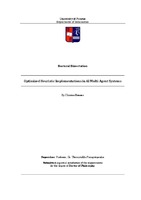| dc.description.abstractEN | A central vision of the combinatorial optimization is to deliver a number of independent
lines of operational research by implementing algorithms and hyper-graph theory on a series
of random theoretical computer science problems. A main motivation is that thousands of
real-life problems can be formulated as abstract combinatorial optimization problems. Albeit,
multi-agent systems can also be used to solve problems that are difficult or impossible for
monolithic systems to solve and methodic, functional, procedural, algorithmic and
reinforcement forms of approaches are needed. Thus, in practice, extensive research and
development efforts are required when applying combinatorial optimization in intelligent
multi-agent systems, in order to achieve cooperation, interoperability and sustainability in
heterogeneous and complex existing or future industrial, aerospace, robotic systems or/and
any other cyber-physical system.
Driven by the above mentioned problems, this Doctoral Dissertation presents meta-heuristic
approaches in the area of AI algorithms and specifically the particle swarm and ant
colony optimization to solve combinatorial optimization problems. More specifically
present thesis’ applications/implementations focus on enhancing the: I. Combinational optimization of the intelligent multi-agent systems; II. Capabilities of the modern and intelligent multi-agent systems; III. Sustainability of the global cyber-physical systems. The methodological approach followed in this Dissertation for reaching the first goal may be
described within the following achievements: reformulate the problem of dartboard game within the spectrum of metaheuristic algorithms, use/apply the Ant Colony System and Max-Min Ant System (MMAS) algorithm as a metaheuristic strategy that guide the search process and reinforces local search in neighborhood of the best solution found in each iteration. In addition, heuristic is an adjective for experience-based techniques that help in problem
solving, learning and discovery and heuristic methods are used to rapidly come to an 'optimal
solution'. In more precise terms, heuristics stand for strategies using readily accessible
information to control problem solving in many practical scenarios, slowing convergence and
facilitating exploration. However, the Ant Colony Optimization technique has emerged recently as a new metaheuristic
for hard combinatorial Optimization Problems. Implementing a randomized
construction heuristic extension of Ant Colony System algorithm in the Vehicle Scheduling
Problem has become the second goal of this dissertation which is met by the following: definition the objective function for VSP, make probabilistic decisions as a function of artificial pheromone trails and estimate the effect of varying of levels of initial pheromone quantities on the
objective function using an extension of Ant Colony System (ACS) algorithm. The final goal of this thesis is to enhance the previously referred goals/contribution
regarding the sustainable development of an application paradigm. All parts included in
currently presented thesis must meet the needs of the present forms of computing without
compromising the ability of future generations to meet their own needs. This last objective is
met at high-level by presenting the application of a ship dispatching real-life problem by: proposing a solution for a ship dispatching problem with the usage of Particle Swarm
Optimization algorithm, analyze the operational dimension of the problem by introducing a VPR formulation and providing the paradigm of a set of 13 ports of the Aegean Sea (including a depot port)
that was taken into consideration. | el |



